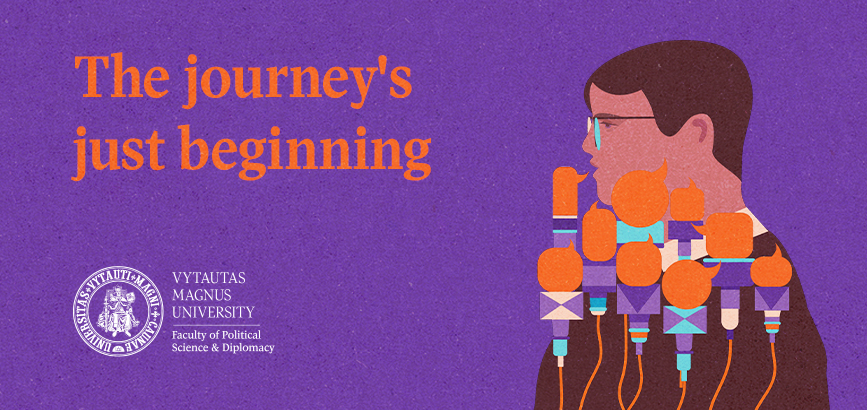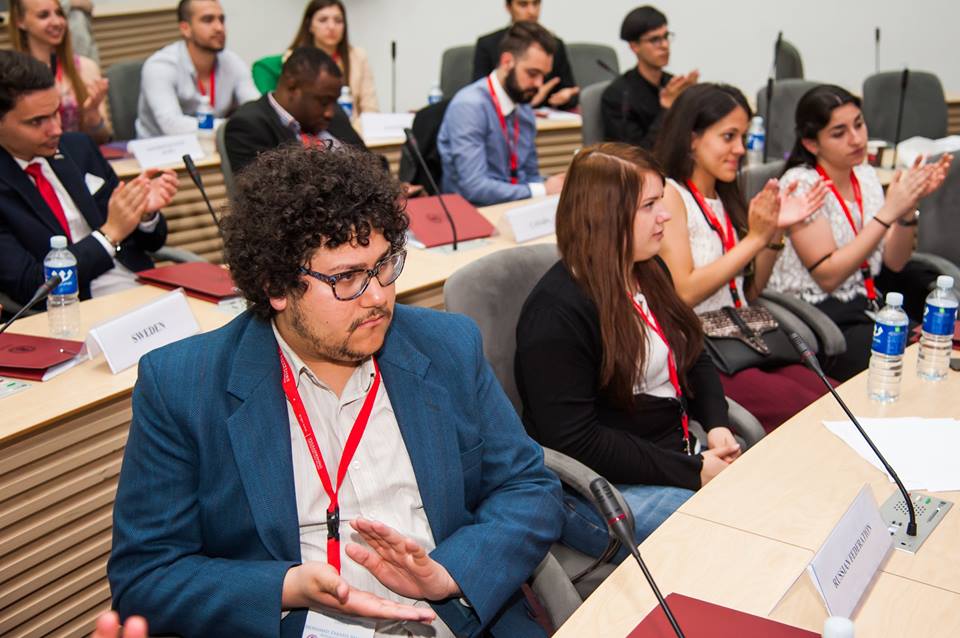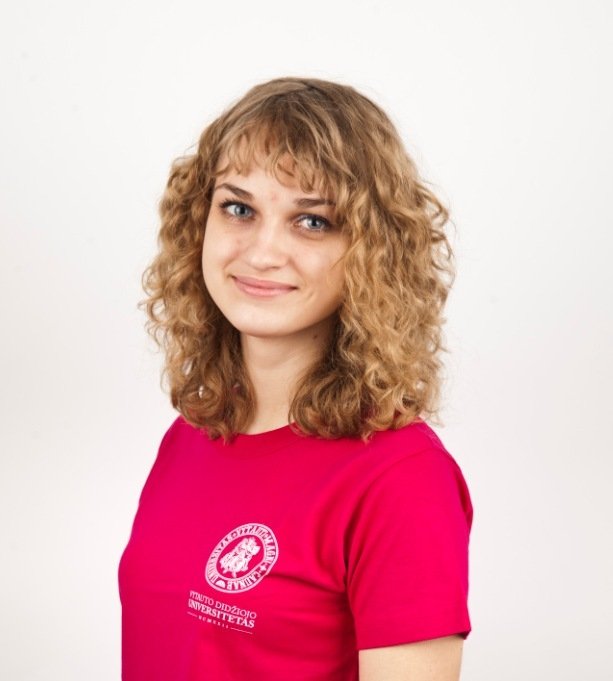MA graduate Italian Manuel speaks about diplomacy studies in VMU
Manuel Tornado is an Italian graduate of Diplomacy and International Relations MA studies programme at the Faculty of Political science and diplomacy. He speaks about his experience while studying at Vytautas Magnus University in Lithuania.
VMU Opened Research Centre Named After A. Sakharov
On 18 December, Vytautas Magnus University (VMU) hosted the grand opening of its new subdivision, Andrei Sakharov Research Centre for Democratic Development. Focusing on issues of human and civil rights, the centre will conduct research into the politics in Central and Eastern European countries analyzing whether they fulfill their international commitments to protect human and civil rights.
Andrei Sakharov was one of the bravest critics of the Soviet regime who eventually became the symbol of the struggle for fundamental human rights. After gaining prominence as the inventor of the Soviet hydrogen bomb, the scientist became concerned about the consequences his invention would have on the humanity’s future and began raising awareness of the dangers of nuclear arms. In the USSR, Andrei Sakharov was seen as a dangerous dissident. His efforts contributed to the signing of the Partial Nuclear Test Ban Treaty in 1963 and the establishment of the Committee on Human Rights seven years later, which was the result of joint work by Sakharov and his peers. In recognition of his achievements, Sakharov was awarded the Nobel Peace Prize in 1975. Because of the activist’s consistent attempts to liberate other Soviet dissidents and criticism of the regime, Sakharov was exiled to the isolated city of Gorky (Nizhny Novgorod) in order to restrict his foreign connections. The European Parliament has established the Sakharov Prize for Freedom of Thought, which is awarded to individuals or organizations that fight for human rights and fundamental freedoms.
A discussion was held during the event by Sakharov’s daughter, researcher Tatiana Yankelevich from the Davis Center for Russian and Eurasian Studies at Harvard University (USA), political scientist and analyst Lilia Shevtsova from the Chatham House (UK), founders of the Moscow School of Civic Education Lena Nemirovskaya and Yury Senokosov (Russia), Co-Director of the Institute for Statecraft Chris Donnelly (UK), Senior Russia Analyst at Radio Free Europe Brian Whitmore (Czech Republic), Project Director of Freedom House Lithuania Vytis Jurkonis, Director of European Security Programme, Vilnius Institute for Policy Analysis Simas Čelutka, and VMU representatives.
Religion and Power
Discussion between Prof. Milda Ališauskienė from Dept. of Sociology and Dep. of Political science at Vytautas Magnus University (Lithuania), Prof. Kathleen M. Moore from Dept. of Religious Studies at UC Santa Barbara (USA), and Assistant Professor Katarzyna Zielińska from the Institute of Sociology at Jagiellonian University (Poland). The participants discussed the subject of recent international conference in Lithuania, Religion(s) and Power(s), where Prof. Kathleen M. Moore and Ass. Prof. Katarzyna Zielińska were keynote speakers.
Discussion by Leonidas Donskis and Lilia Shevtsova
Discussion with Prof. Leonidas Donskis ( In memoriam), political philosopher from VMU Faculty of Political Science and Diplomacy, and Lilia Shevtsova, Kremlinology expert, senior associate at Carnegie Endowment for International Peace.
Interview with the former president of Moldova
Political Science Professor Lauras Bielinis speaks with the President of Moldova (1996–2001), Petru Lucinschi. President Lucinschi visited VMU during the 2nd Forum of the Baltic and Black Seas in March of 2017.
Former Heads of State from CEE Met at Forum in VMU
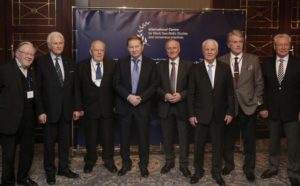 On Friday 10 March, 2017, Vytautas Magnus University and Kaunas City Municipality co-hosted the first event dedicated to the approaching Centennial of the Restoration of the State of Lithuania– the 2nd Forum of the Baltic and Black Seas, a discussion with the historical leaders, former heads of state from Central and Eastern Europe.
On Friday 10 March, 2017, Vytautas Magnus University and Kaunas City Municipality co-hosted the first event dedicated to the approaching Centennial of the Restoration of the State of Lithuania– the 2nd Forum of the Baltic and Black Seas, a discussion with the historical leaders, former heads of state from Central and Eastern Europe.
The theme of the forum is “Europe Today. The Baltic Consensus (1987–1991): Historical Significance and Lessons for the Today’s World”. On the eve of 11 March, the Day of Restoration of Independence of Lithuania, the historical leaders, along with the academic community and other political, cultural and social figures, invited everyone to revive the historic memory, to look for new forms of dialogue, and to seek productive, good-neighbourly, responsible, and peace-promoting communication that is based on mutual trust and respect.
According to the EU Ambassador in Russian Federation, Vygaudas Ušackas, the success story of the Baltic States is like a beacon for the countries of the Black Sea region in their way of continuous development towards democracy, free market and mature civil society. “Amid geopolitical tensions, confrontations and threats it is worth listening to the wisdom of historical leaders who played a significant role in the collapse of the Soviet Union and the reestablishment of statehood of their respective countries. Aiming to inspire faith in a dialogue and communication, Kaunas has summoned historical leaders in the name of security and prosperity, from the Baltic Sea to the Black Sea and far beyond”, the Ambassador underscored the importance of the event.
It is no coincidence that the former Presidents of Bulgaria, Estonia, Latvia, Poland, Lithuania, Moldova, Slovakia, and Ukraine joined the search for solutions in an academic venue. In the face of global challenges and regional threats of the 21st century, it is necessary to remember the national struggles for democracy and freedom and to engage in a closer dialogue with the academic community, especially the young generation.
“It is both symbolic and meaningful that the forum will take place at Vytautas Magnus University: after being re-opened on the eve of the country’s independence by Lithuanian and diaspora scientists and intellectuals, this university became one of the first heralds of Lithuania’s freedom and a hub of humanist worldviews. Today, as we are standing once again at the doorstep of change, we call on everyone to turn to the ideals that led us towards democratization. In the name of peaceful solutions, we open the door for dialogue between the state and the citizens”, VMU Rector Prof. Juozas Augutis stated, highlighting the significance of universities in the considerations of the future.
The anticipated participants of the Forum of the Baltic and Black Seas included former European heads of state who in the recent past dared to change the course of Europe, to steer it towards democracy and to strive for an active civil society in independent countries: Valdas Adamkus (Lithuania), Vytautas Landsbergis (Lithuania), Viktor Yushchenko (Ukraine), Bronisław Komorowski (Poland), Leonid Kravchuk (Ukraine), Leonid Kuchma (Ukraine), Petru Lucinschi (Moldova), Arnold Rüütel (Estonia), Petar Stoyanov (Bulgaria), Rudolf Schuster (Slovakia), Valdis Zatlers (Latvia), Gennady Burbulis (Russia).
In the 1st Forum of the Baltic and Black Seas, which was organized in 2016, its participants signed the Kiev Manifest, which named the mission of united and purposeful peacekeeping as their goal. “Our common goal is to promote a system of values that is based on joint actions and ensures mutual understanding and support, along with a dialogue between generations and ideologies, the people and the state”, the manifest said.
The region of the Baltic and Black seas, which has been shaped by the diversity of nationalities, faiths, and cultures, has a long and shared history. The former heads of state emphasize that it is only democracy, peace, and complete renouncement of war and aggression that can help the European community of nations to ensure security in the region.
The event was organized by Vytautas Magnus University and Kaunas City Municipality. The forum was also supported by the project of the European Union “Public Diplomacy. EU and Russia”.
Historical leaders, participants of the Forum of the Baltic and Black Seas:
- Valdas Adamkus, President of Lithuania (1998–2003 and 2004–2009), VMU Council Chairman, Honorary Doctor
- Vytautas Landsbergis, the first head of state of the re-established independent Republic of Lithuania, the Chairman of the of the Supreme Council of Lithuania (1992, 1996–2000), VMU Honorary Doctor
- Viktor Yushchenko, President of Ukraine (2005–2010)
- Leonid Kuchma, President of Ukraine (1994–2004)
- Petru Lucinschi, President of Moldova (1996–2001)
- Arnold Rüütel, President of Estonia (2001–2006)
- Lech Wałesa, President of Poland (1990–1995)
- Gennady Burbulis, Secretary of State of the Russian SFSR (1991–1992)
During the conference, exhibition The Baltic Way by VMU professor, photographer Romualdas Požerskis was exhibited at the lobby of VMU Great Hall (28 S. Daukanto g., Kaunas). The exhibition captured the historical period when the leading positions in Europe were occupied by some of the conference participants.
“Lithuania stands for the spirit of freedom kept alive by thousands and thousands of people – a spirit that survived Siberian frosts, betrayals by Soviet secret service collaborators, and the horrors of the gulag. Romualdas Požerskis managed to capture this ultimate aspiration in his photo exhibition and photo album “Lithuania in 1988-1993″. For many years Lithuania had been suppressed by a brutal force which crossed our border in 1940 through deception and blackmail with unconcealed intent to stay forever. Lithuania resisted the foreign army: the partisants, dissidents, the entire nation had never lost hope to regain freedom and independence”, President of the Republic of Lithuania Dalia Grybauskaitė is quoted in the introduction of the exhibition.
Why do foreign students choose studies in VMU?
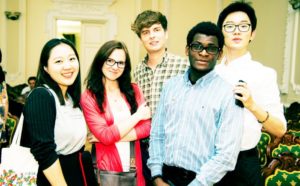 Vytautas Magnus University (VMU) is a classical university of liberal arts which pays a particular attention on the internationalization of the studies and research. It is one of the most international universities in Lithuania and the wider Eastern Europe and Baltic region. Every year an increasing amount of foreign students has been coming from European, Asian and American continents to study here. What are the main reasons of their choices? Why do foreign students choose studies in VMU? About the choices and experiences – we speak with the students, who came from the very different countries (USA, Morocco, Ukraine, Georgia, Venezuela and Turkey) and decided to study “International Politics and Development Studies”, one of the most popular bachelor level program among foreign students.
Vytautas Magnus University (VMU) is a classical university of liberal arts which pays a particular attention on the internationalization of the studies and research. It is one of the most international universities in Lithuania and the wider Eastern Europe and Baltic region. Every year an increasing amount of foreign students has been coming from European, Asian and American continents to study here. What are the main reasons of their choices? Why do foreign students choose studies in VMU? About the choices and experiences – we speak with the students, who came from the very different countries (USA, Morocco, Ukraine, Georgia, Venezuela and Turkey) and decided to study “International Politics and Development Studies”, one of the most popular bachelor level program among foreign students.
Internationally recognized diploma for an affordable price
Olivia Wells: I was studying at University of Southern California and I did an exchange program to Greece. After spending a year in Greece I decided that I wanted to switch my major, which was classics, to international relations. I also wanted to stay in Europe, so I did a lot of research about programs in English in Europe in political science and international relations. VMU fit my requirements and it was also very affordable for me. That was a huge factor. As it is known, studying (especially getting your undergraduate degree) in the US is ridiculously expensive. The financial aspect of my studies was very important.
Nikoloz Chkheidze: There was a correlation of few factors that motivated me to come and study in Lithuania. Firstly, finishing studies in Lithuania would have been more recognized and accredited worldwide rather than finishing studies in Georgia. Secondly, the prices were more convenient and attractive than those in Western Europe, and lastly my Lithuanian friends that I have made in school period – made me decide to come to study in Lithuania.
Anna Romanenko: It was a great opportunity to study abroad and to get an international diploma, because the diploma from Ukrainian universities is not so recognized in the European countries. It also gives me a great opportunity to get a perfect job.
Muhammed Nas: Actually, my main motivation to come to Lithuania was because it is really affordable and my plan was to transfer my credits from Lithuania to the United Kingdom but I saw that I really achieved very good success at Vytautas Magnus University, so I decided to stay here.
Calm, students oriented city and historically interesting regional environment
Olivia Wells: I realized the benefits of staying in Europe while studying international relations. You’re sort of in the middle of everything that’s going on. It is also really interesting to study in this part of Europe considering Russia and the dynamics of the Cold War, which is an important aspect of international relations. I didn’t have a lot of preconceived notions about Lithuania. You have to understand that in the US it’s very much grouped with the other Baltic States and Eastern Europe in general. So when we study what happened in this part of the world, we don’t go into the individual states. It’s very much monolithic block vs. Russia and how Russia interacts with Eastern Europe as a whole, which is unfortunate, but it’s true.
M.Zakaria Belmehdi: Why exactly Lithuania? Because, first of all, I want to study in Eastern European country, because of the culture, because of history- these are the first factors that attracted me. For me coming to Lithuania was not challenging in comparison to the UK. As concerning integration with people, for me it was easy here, because Lithuanians are open-minded. So, I do not have any problems, as far as I want to integrate. Of course, there are little challenges, but in general, my experience was very positive here. Before coming to Kaunas, I had a concern, because the population of Kaunas is 98 per cent Lithuanians. On the other hand, I wanted to live in a homogeneous country meanwhile having some multicultural experience. I met many friends and people from different countries not only from VMU, but from other universities as well. For me, Kaunas is really suitable for a student life since there are a lot of activities, at least during the academic year.
Muhammed Nas: Kaunas is a beautiful city. It has a warm environment and very beautiful green places and historical places as well. Actually, the people are nice, multicultural communication is very vivid here and I totally agree that it is a student city. Here there are more than 3 universities, hence it includes very different types of nationalities and thus these international students make the city more rich culturally and colorful.
Nikoloz Chkheidze: I would agree, not only that Kaunas is full of international students, but it is also a city, where a lot of Lithuanians come from other parts of their country – this makes Kaunas a multicultural student city.
Konrad Petraitis: Sometimes while walking the Liberty Avenue you feel how quite it is. That was new experience since you would never ever experience that in Venezuela. You could be in the middle of nowhere in Latin America and you still hear people screaming and shouting. That’s why people here look at me weird if I talk more loudly. So Lithuania taught me the difference between talking and shouting, and inside and outside voices. Although Lithuanians are quiet, but they are very curious as well, so they do want to get to know foreigners, they do open a lot of doors for you. With some of Lithuanians I even get along better than with my siblings.
Anna Romanenko: Lithuania is not so far from Ukraine and we share some common history such as the Soviet period, so sometimes I can talk in Russian with adults, because a lot of older generation people know Russian and it is really helpful for me. So I didn’t really feel like in a completely different environment.
Ukrainian Anna Romanenko will seek to apply the university knowledge in her country after graduation.
Liberal, friendly and welcoming university atmosphere
Nikoloz Chkheidze: The friendly acceptance coming from university staff, teachers and students of Vytautas Magnus University made it much easier to adapt. Together with my friend, we were always feeling the support coming from locals in anything we needed whether it was something related to university or a completely different issue. The atmosphere is amazing in the university, no matter how involved and active you are, it makes you feel to be part of it, as the city is also small and full of students, this makes the inside of university even more comfortable and cozy. The constant movement of flows of people in different buildings makes you alive and motivated to go out and do something. The university offers you opportunities such as doing an Erasmus abroad and participating in many local and international events of political scope.
Konrad Petraitis: I applied for several other universities but VMU just convinced me, honestly, the treatment I got here just applying, really, it took me over, I can’t complain. VMU kind of hit the tone with me, they are very relaxed people, they are very down to earth, they provide you with the tools to succeed and if you don’t want to take them, it’s up to you. But VMU invented itself so, that you not only take them, but it would do everything for you. I have that impression, which, I assume that some people need more than the others.
M.Zakaria Belmehdi: University atmosphere is friendly, international and funny. Friendly because both Lithuanians and foreign students that I’ve met here are really friendly, open-minded and open to other cultures, so we have a lot of cultural exchanges. It is really easy to make friends here. It is really international, because there are foreign students from around 50 countries. Although the majority of them are from Europe, there are students from outside Europe as well. Moreover, university has a lot of student clubs, which help students to have fun, to relax, enjoy his moment and time here in Lithuania.
Open-minded administration supports students’ initiatives
Olivia Wells: I like it and I was very surprised by it. There are definitely things that need to be worked on, however, I like that it’s smaller because I’ve been in smaller and very large universities and in larger universities there’s a gap between the students and the administration. You don’t feel like you can easily approach any of the staff and it’s very bureaucratic, so it’s difficult to get anything done. I’m really grateful that it is easy to talk to people here and they are helpful. I liked the administration – from there I decided that I wanted to get involved in different extra curricular activities. It’s quite easy to do all these extra curricular activities and if you are the kind of person that wants to get involved, it is a great school for that because the university really supports students’ initiatives.
Anna Romanenko: From the first letter of acceptance and even starting from when I sent my documents to the international office, I was really happy that they were speaking to me warmly, they were really friendly and when I came the environment was also very friendly. Also Eglė, from International Office, really helped me a lot in the beginning, and even now, when I have some questions, she is always happy to help me without any problems.
Muhammed Nas: I tried to be as active as possible. So, during my studies I did a lot of initiatives. One of them was the establishment of United Nations students club. After the meeting with the UN Secretary General Ban Ki Moon, who visited VMU, we decided to establish this organization. Within the activities of this student organization we widely announced our university name while communicating with diplomatic representatives, especially in the Embassy of Sweden, the Embassy of Republic of Turkey, the Embassy of the USA and so on. So people really appreciate our initiatives. So after achieving this, I decided to stay here, I had very good success which is going to be very useful for my future life.
Focus on personal development: interesting and challenging studies in multicultural environment
Olivia Wells: Simply speaking about my knowledge base, it has really expanded, that’s undeniable. I could also say that I’ve been the most active as a student in university life and involving myself in extra curricular activities than I ever was in the US. So that has been really great for me. I was able to work and do a lot. Of course, it depends a lot on the person.
Nikoloz Chkheidze: It gave me also a better understanding of myself, my strengths and weaknesses as well as it determined me more as a person, knowing exactly what I want and what to strive for. By choosing to study in Lithuania, I believe I made a very good choice and I am satisfied. The program turned out to be exactly what I was interested to study.
Konrad Petraitis: It gave me a lot more that I could ever express in any interview. I am eternally indebted to this university, to every single professor, to every single staff member and it is going to be my alma mater forever. VMU will give you every single thing to you to succeed and it’s only up to you whether you’re willing to take them. You will have to work, play your part, but as I said, VMU has that big fish in a small pond mentality that helps people to succeed.
M.Zakaria Belmehdi: When it comes to this particular study program, for those, who wish to study politics, I definitely recommend them to come to study here. Also, people who are looking for fun, for good quality of education and international environment- I recommend them to come to VMU.
Anna Romanenko: When I came to the faculty of Political Science and Diplomacy I was really surprised by the level they are teaching, because the level of English of lecturers were really good, they are helpful and the lectures are interesting for me. I understood that I am happy to be here and I’m lucky to study in such a university. In the beginning it was really difficult for me due to everything was in English, every lecturer wants something from you, and you need to write and read a lot of, hence the first year was really challenging for me. But then I started to develop myself and improve my language and communication skills, I started to read more. So I believe I really grew up as a person.
Muhammed Nas: I had very intelligent and professional lecturers, who are open-minded, informative and smart. This study program is a comprehensive, the content of the program is acceptable by other universities worldwide and it includes very good topics. Besides of being a good political scientist, you can increase your knowledge and it really contributes to your life, because you can select very different type of elective courses such as Media Art, Philosophy, Biology and so on. So I really call people, who want to study political science to come here. If they are going to struggle, because if there is no struggle, there is no achievement, if they are going to study hard, VMU is very international university and therefore they will achieve the goals.
Dr. Sima Rakutienė: „ There is no question that multicultural environment creates opportunities not only to know, but also to feel and hear the voices of different peoples and cultures right here in the classroom, to study international politics in the international community, to analyze the effects of global importance, socio-political and economic processes. Each year the program attracts foreign students from various parts of the world (Morocco, Venezuela, Ukraine, Georgia, USA, Nigeria, turkey and etc.) and creates an invaluable intercultural environment and experience for both: teachers and students“.




